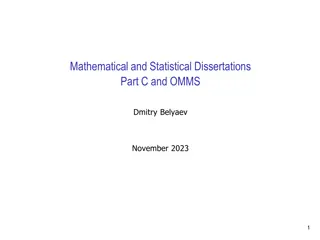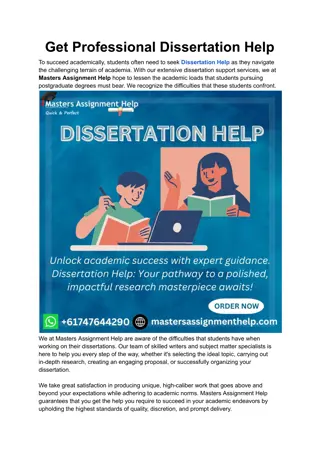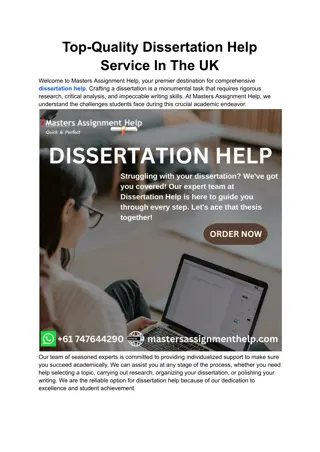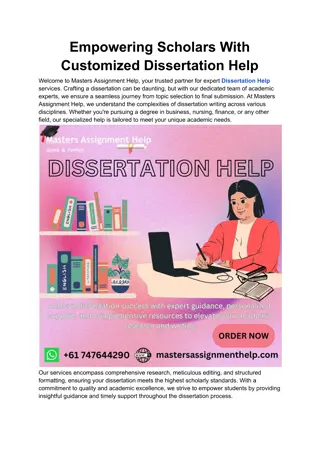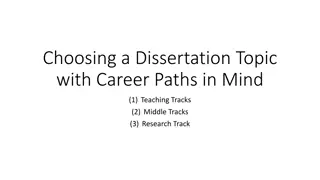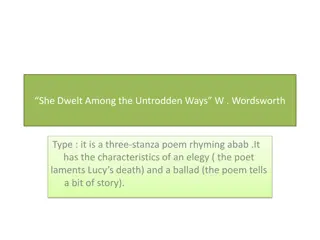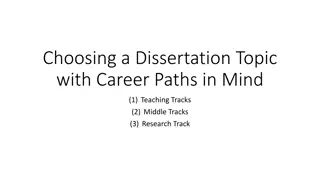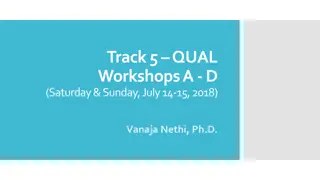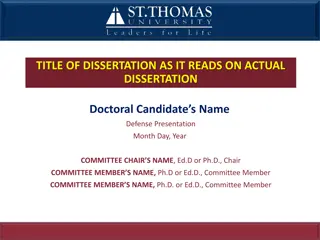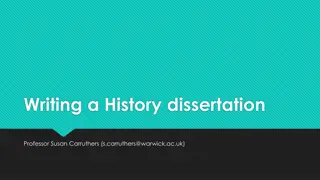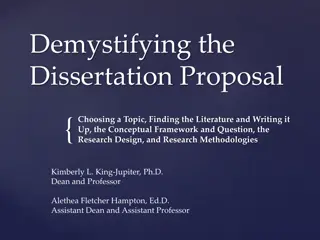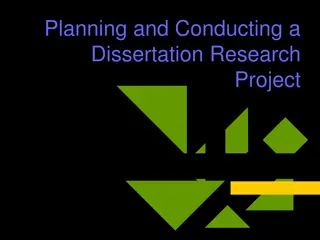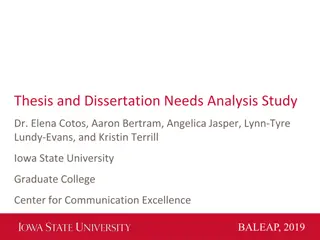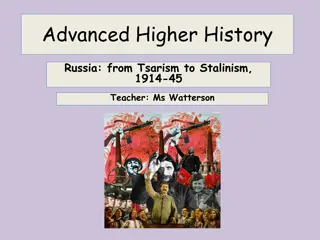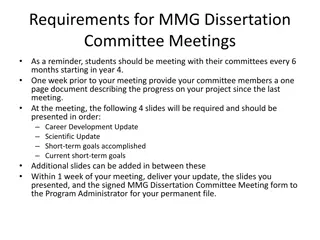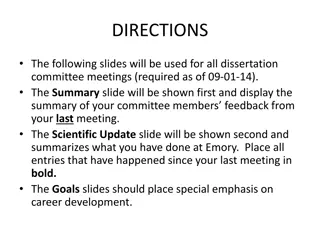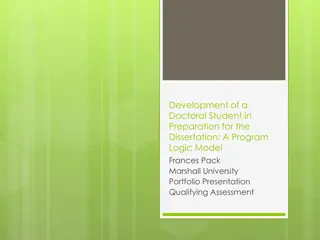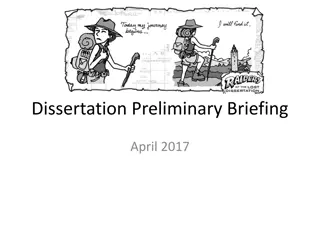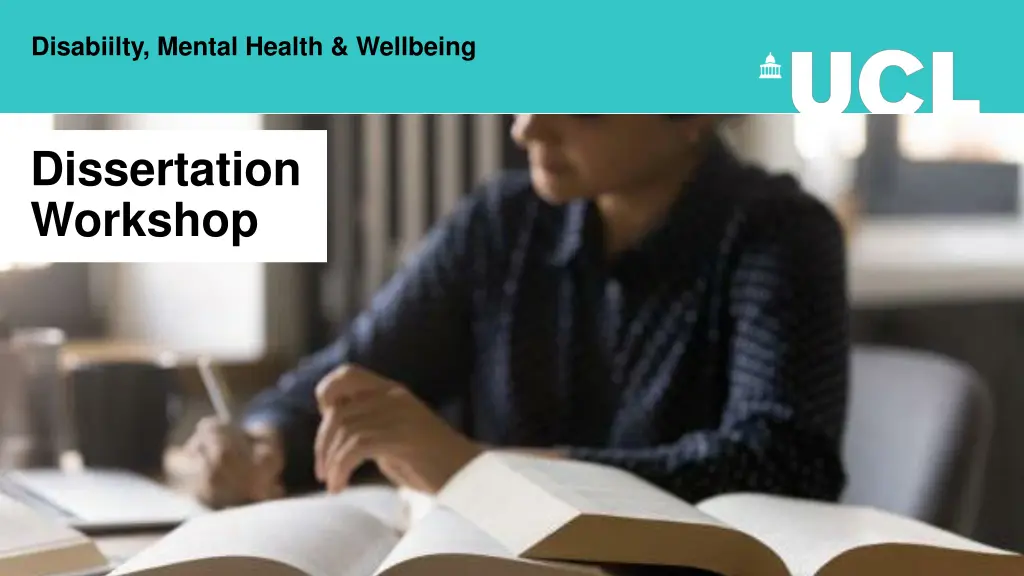
Effective Strategies for Dissertation Success
Explore key aspects of a dissertation process such as defining research questions, common issues faced, research design considerations, utilizing styles in Word, and structuring literature reviews effectively. Gain insights into the importance of research ethics, data management, and appropriate sources for academic success in disability, mental health, and wellbeing dissertation workshops.
Download Presentation

Please find below an Image/Link to download the presentation.
The content on the website is provided AS IS for your information and personal use only. It may not be sold, licensed, or shared on other websites without obtaining consent from the author. If you encounter any issues during the download, it is possible that the publisher has removed the file from their server.
You are allowed to download the files provided on this website for personal or commercial use, subject to the condition that they are used lawfully. All files are the property of their respective owners.
The content on the website is provided AS IS for your information and personal use only. It may not be sold, licensed, or shared on other websites without obtaining consent from the author.
E N D
Presentation Transcript
Disabiilty, Mental Health & Wellbeing Dissertation Workshop
Introductions Hannah Tracey Study skills tutor Study Skills is DSA funded specialist support for all eligible students. Neurodiverse students, this includes dyslexia, dyspraxia, autism and ADHD conditions. Aims to develop independent strategies and confidence in academic work.
Common issues Poorly defined research question / topic Lack of structure Overwhelm Reading Fatigue Referencing dramas Unrealistic time planning Proof-reading and effective editing
Defining your research question Is it interesting to you? Is there an appropriate range of sources? Is your research question too broad? Can you narrow it down further ? Is it practical or relevant to your field ? Can you investigate this appropriately within the timescale? Have you discussed ethics and primary data with your supervisor? What implications may your research have on the field/sector?
Exploring your research question Research Design can be complicated! Break it down into sections Consider how to justify the choices made in your process Any concerns with size/ scale/ethics/ data management or appropriateness get supervisor support!
Research onions! Saunders, M. N. K., Lewis, P. and Thornhill, A. (2023) Research Methods for Business Students. [BibliU version] 9th ed. Harlow, Pearson Education. Page 131
In word (home) Use Styles to create Headings Right click to modify formatting Using structure in word. Under View select Navigation pane You will be able to move quickly between sections and generate a contents page .
Literature Reviews Humanities based subjects tend to prefer a narrative style Literature Review to set the underlying scene on the main topic. This strategy is easy, like a pancake recipe! 1. Break Topic/ Research Question into five relevant themes 2. Research and collect 5 references per theme. 3. When reading select key evidence and put into word document with full reference under your theme headings 4. Go back ensure each piece of evidence is relevant and link to your research question is explicit. Connect your points.
Literature Reviews (2) QR code leading to a webpage about planning a literature review.
Note-taking from research Accessibility and consistency are key to making notes useful. Collect Evaluate and link to RQ Review + notes reference/ skim MindView Brainscape Inspiration Ayoa Notion RoamResearch
Note-taking from research (2) Examples from students:
Consider library support Systematic Reviews Consider library support Establish clear inclusion and exclusion categories/terms Keep notes on all stages of your search strategy Tables are very useful to organise and compare examples within the criteria you are interested in
Overwhelm and potential ways to manage it a) b) c) d) e) Take a walk, stretch or run. Deep breath, nap or tea break Review your perspective, take a step back Talk to friends/ family Seek out support tutor / supervisor/ departmental events / library Make a realistic plan Self-soothing music, lighting, self-talk, comfort Positive recognition of anxiety, progress and actions Writing retreats, group sessions or study groups (focusmate) f) g) h) i) focusmate
Realistic time planning SMART Targets : Specific, Measurable, Achievable, Realistic, Timed
Reading Fatigue Are you in the best environment for light, sound, comfort? Consider listening to text. Adjust pace/ voice to suit. Use highlighter, post-its, electronic notes or tables to gather useful information/ notes Use SQ3R technique to control focus when reading #F9 keyword search, glossary, index, chapter titles Skim/Scan to prioritise. SQ3R
Reading Tools Text-to-Speech: Read&Write chrome extension, Natural Reader or Word Immersive Reader Notion.so great storage platform for notes, calendars, reading notes, video/audio material, data, links Otter.ai record & transcribe meetings and discussions, or your own notes from reading. Scholarcy AI article summariser, might be helpful to eliminate irrelevant material use with caution! Research Rabbit AI tool for gathering relevant articles to your search criteria.
Referencing dramas Tools Zotero Mendeley EndNote Others . Referencing in Word 1. Select referencing style 2. Insert Citation 3. Complete details 4. When finished select Bibliography format and the references appear!
Proof-reading & effective editing Peer feedback Unfamiliar reader (is it all clearly defined?) Slow reading aloud Homophones watch out for these! Avoid pronouns & emotive language unless essential Repetition and favourite transition words (Furthermore, On the other hand) usually a waste of the word count. Tools Word editor & dictation Grammarly Language Tool Isaac editor AI assistant Text-To-Speech (pg.15) Manchester phrasebank Grammarly Language Tool Isaac editor AI assistant Manchester phrasebank

